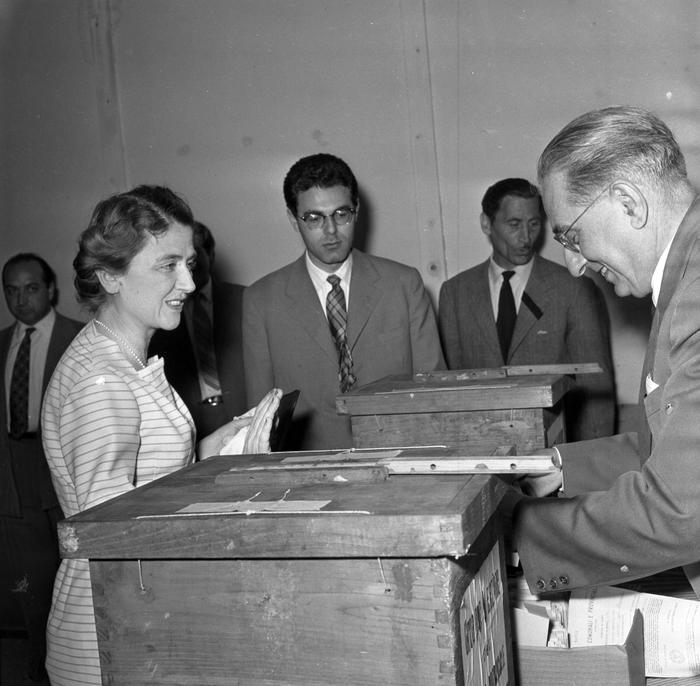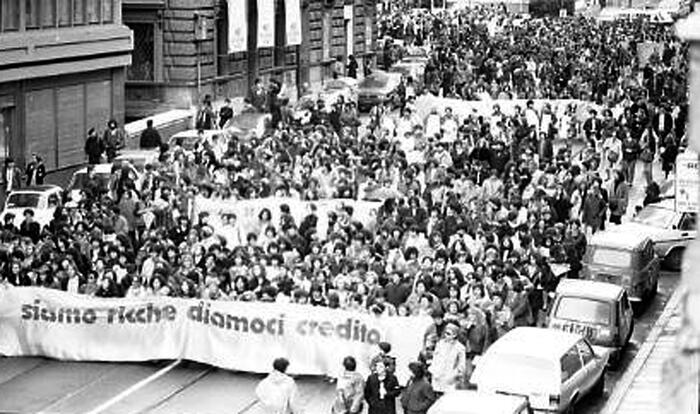As we all know, women are emotional, this is the reason that has been heralded for years to exclude them from political life and from the right to vote. Or, they are weak and risk being influenced by the Church, according to the ancestral fear of the Italian left parties. So the struggle to achieve universal suffrage, introduced in Italy on February 1, 1945, was tough, and starts from afar .
A bit of history
At the end of the eighteenth century Olympe de Gouges signs the 'Declaration of the rights of women and towns' in France but does not go far because it will be guillotined. It is from the mid-nineteenth century that everywhere in Europe the first associations in favor of voting for women are formed. England will radicalize the struggle with the creation in 1897 of the National Union of Women's Suffrage Societies, to which adepts will be given the derogatory name of Suffragette. Through an intense campaign of conferences, marches, often violent marches, in the end in Britain women will be admitted to the vote in 1928. In Italy, excluded from the reform of 1882 and from that of 1912, which introduced universal male suffrage, Mussolini thinks of women at the polls. He admitted them to the administrative vote in 1924, but it is pure and simple propaganda, since following the enactment of the so-called "fascist laws" between 1925 and 1926, elections for municipal appointments were prohibited. The fascist regime in fact replaced the election to the office of mayor with the governmental appointment of the podestà and the governor. We will have to wait for the end of the war for Italy to tackle the problem. Established the National Liberation Government, women take action to join the electoral body: the first request in October 1944 was from the Commission for the vote for women of the Union of Italian Women (Udi) which subsequently mobilized to obtain non only the right to vote but also that of eligibility. February 1, 1945 is the historic date when, with a legislative decree, the Council of Ministers chaired by Ivanoe Bonomi recognizes the female vote, on the proposal of Palmiro Togliatti and Alcide De Gasperi.
The debut of women at the polls comes with the administrative elections between March and April 1946, while on June 2 of the same year they will participate in a vote of quite another historical importance: it is the institutional referendum to choose between monarchy and republic and the election of the Constituent Assembly . The decree introducing universal suffrage orders the compilation of female electoral lists distinct from male ones and excludes registered prostitutes who exercised "prostitutes outside authorized places" from the right to vote. To sanction women's eligibility, a new decree of 10 March 1946 will be needed.
Participation in the administrative vote is a plebiscite, women's turnout exceeds 89% . About 2,000 candidates are elected on city councils, the majority on the left lists. The same turnout of women will be recorded for the referendum of June 2, 1946. On the morning of June 2, the 'Corriere della Sera' comes out on newsstands with the article entitled "Without lipstick in the voting booth" with which it invites women to present themselves at the seat without lipstick on the lips. The motivation is: "Since the form must be glued and must not have any sign of recognition, women in wetting the flap to be glued with their lips could, unwittingly, leave you a little lipstick and in this case make the their vote. So bring lipstick with you to revive your lips outside the seat. "[. The women elected to the Constituent Assembly will be 21 out of 226 candidates, equal to 3.7 percent. A small group that will be remembered as 'constituent mothers ' who, although belonging to different political sides, will be able to apply a team game on issues such as equality, the family, the recognition of children born out of wedlock, equal pay, women's access to professions. He will therefore know how to constitutionalize rights and lay the foundation stone of fundamental laws for the daily life of the nation and for its modernity.
But who are the 21 women elected to the Constituent Assembly? With which party were they elected? What did they do before writing the Constitution? Here are the "identity cards" of our Constituent Mothers (source the blog The journey of the Constitution).
ADELE BEI
Place of birth: Cantiano (PU)
Profession: housewife
Party: Communist Party
In Assembly: supports equality between men and women.
WHITE WHITE
Place of birth: Vicchio (FI)
Profession: teacher
Party: Socialist Party
In Assembly: supports various interventions on school, pensions and employment. In particular, he remembers his intervention for the legal recognition of natural children.
LAURA BIANCHINI
Place of birth: Castenedolo (BS)
Profession: teacher, publicist journalist
Party: Christian Democracy
In Assembly: supports interventions on education and in favor of public school. She also holds the position of secretary of the Education and Fine Arts Commission.
ELISABETTA CONCI
Place of birth: Trento
Profession: teacher
Party: Christian Democracy
In Assembly: he is a member of the Commission of 18, with the task of coordinating the special regional statutes of autonomy with the Constitution.
MARIA DE UNTERRICHTER JERVOLINO
Place of birth: Ossana (TN)
Profession: teacher
Party: Christian Democracy
In Assembly: alongside De Gasperi in the Commission for International Treaties and for the drafting of an agreement with Austria on South Tyrol. It is also part of the subcommittee of inquiry for school reform.
FILOMENA DELLI CASTELLI
Place of birth: Città Sant'Angelo (PE)
Profession: teacher
Party: Christian Democracy
At the Assembly: he intervenes in particular on issues related to the family.
MARIA FEDERICI AGAMBEN
Place of birth: L'Aquila
Profession: teacher
Party: Christian Democracy
In Assembly: he is a member of the Commission for the Constitution and a member of the Third Subcommittee (economic and social rights and duties).
NADIA GALLICO SPANO
Place of birth: Tunis
Profession: journalist
Party: Communist Party
At the Assembly: he intervenes in particular on issues related to the family. Its best-known initiative is the organization, in collaboration with the Red Cross and the Municipality of Rome, of the so-called "trains of happiness", convoys that transported 70,000 southern children who were orphaned in the families of Northern Italy.
ANGELA GOTELLI
Place of birth: Albareto (PR)
Profession: teacher
Party: Christian Democracy
In Assembly: it is part of the Commission of 75 for the drafting of the constitutional text and is part of the First Subcommittee on citizens' rights and duties. He also spoke on the judiciary and on the right of women to access the high levels of the judiciary.
ANGELA GUIDI CINGOLANI
Place of birth: Rome
Profession: State employee, Labor Inspector
Party: Christian Democracy
At the Assembly: intervenes in the discussion of the law, later ratified in 1950, on the "Physical and economic protection of working mothers", a deterrent against layoffs and penalties for women on maternity leave
NILDE IOTTI
Place of birth: Reggio Emilia
Profession: teacher
Party: Communist Party
In Assembly: it is part of the Commission of 75, intervening in favor of the family and the emancipation of women; is a member of the I Subcommittee, in which he fights for the affirmation of the principle of equality between spouses, the recognition of the rights of children born out of wedlock and de facto families
TERESA MATTEI
Place of birth: Genoa
Profession: teacher
Party: Communist Party
At the Assembly: she is Secretary of the Bureau
ANGELINA MERLIN
Place of birth: Pozzonovo (PD)
Profession: teacher
Party: Socialist Party
In Assembly: he is a member of the Commission of 75 and of the III Subcommittee, where he supports the duty of the State to guarantee to all citizens the minimum necessary for existence, to ensure each individual the right to create a family. He also expressed himself in favor of the property right guaranteed by the state and accessible to all citizens
ANGIOLA MINELLA MOLINARI
Place of birth: Turin
Profession: teacher
Party: Socialist Party
At the Assembly: does not speak but presents various other questions together with others
RITA MONTAGNANA
Place of birth: Turin
Profession: artisan, publicist journalist
Party: Communist Party
At the Assembly: does not speak but presents various other questions together with others
MARIA NICOTRA VERZOTTO
Place of birth: Turin
Profession: crocerossina, ACLI executive
Party: Christian Democracy
At the Assembly: he is part of the parliamentary commission of inquiry into misery in Italy and supervises the conditions of prisoners. It also strives for physical protection, for the economic conditions of working mothers and for the control of the press intended for children and adolescents
TERESA NOCE
Place of birth: Turin
Profession: trade unionist, publicist journalist
Party: Communist Party
In Assembly: he is a member of the Commission of 75, where he makes an important contribution to art. 3 of the Constitution, with the insertion of the phrase "All citizens [...] are equal before the law, without distinctions of sex", legal basis for achieving full equality of rights between men and women
OCTAVIA PENNA BUSCEMI
Place of birth: Caltagirone (CT)
Profession: trade unionist, publicist journalist
Party: Front of Any Man
At the Assembly: does not speak but presents various other questions together with others. His party nominated her as President of the Republic, a position later obtained by Enrico de Nicola
ELETTRA POLLASTRINI
Place of birth: Rieti
Profession: party official
Party: Communist Party
At the Assembly: does not speak but presents various other questions together with others
MARIA MADDALENA ROSSI
Place of birth: Codevilla (PV)
Profession: chemistry, publicist journalist
Party: Communist Party
In Assembly: he is a member of the Commission for international treaties. In this context, he will intervene on the approval of the Peace Treaty between Italy and the allied powers signed in Paris on February 10, 1947. He also works for the recognition of female equality both in the family and in the world of work and supports the law of women to access and participate in the administration of justice in both civil and criminal matters
TITOMANLIO VICTORY
Place of birth: Barletta (BT)
Profession: teacher
Party: Christian Democracy
In Assembly: intervenes in defense of regional autonomy as an expression of freedom and democracy and in support of the publication by newspapers of the corrections of news about people whose dignity has been harmed.






